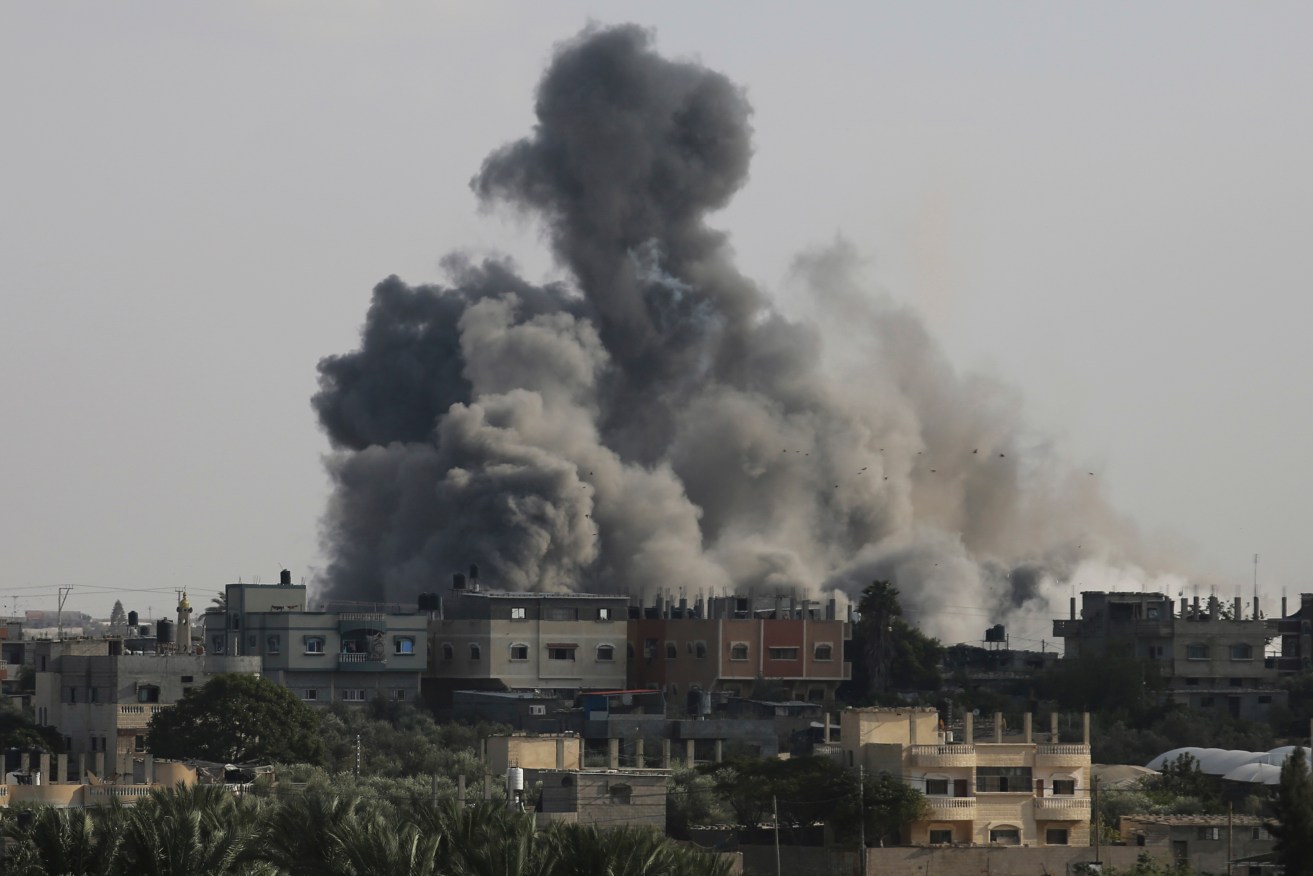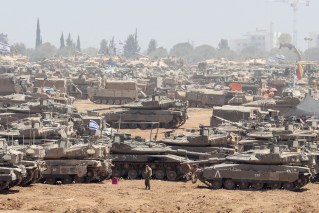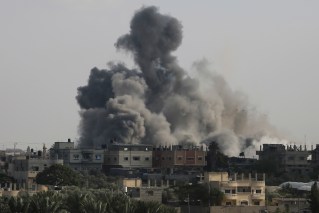Gaza ceasefire talks as Israel continues Rafah strikes

Talks aimed at pausing Israel's offensive in Gaza continue as Palestinian militant group Hamas says it is unwilling to make more concessions. Photo: AAP
Palestinian militant group Hamas says it is unwilling to make more concessions to Israel in negotiations over a ceasefire for Gaza, although talks were still under way in Cairo aimed at pausing Israel’s seven-month-old offensive.
Israel continued tank and aerial strikes on the southern Gaza city of Rafah on Wednesday and has threatened a major assault on it. Its forces moved in via the Rafah border crossing with Egypt on Tuesday, cutting off a vital aid route and the only exit for the evacuation of wounded patients.
Izzat El-Reshiq, a member of Hamas’ political office in Qatar, said in a statement late on Wednesday that the group would not go beyond a ceasefire proposal it accepted on Monday, which would also entail the release of some Israeli hostages in Gaza and Palestinian women and children detained in Israel.
“Israel isn’t serious about reaching an agreement and it is using the negotiation as a cover to invade Rafah and occupy the crossing,” said Reshiq.
There was no immediate comment from Israel, which on Monday declared that the three-phase proposal approved by Hamas was unacceptable because terms had been watered down.
Delegations from Hamas, Israel, the US, Egypt and Qatar have been meeting in Cairo since Tuesday. Citing a senior source, Egypt’s state-affiliated Al Qahera TV said the talks in Cairo continued throughout Wednesday and into the night.
The US said on Tuesday that Hamas had revised its ceasefire proposal and the revision could overcome an impasse in negotiations.
Just a few hours before Hamas’ latest statement, Washington continued to say the two sides were not far apart.
“We believe there is a pathway to a deal … The two sides are close enough they should do what they can to get to a deal,” US national security adviser Jake Sullivan told reporters.
The US aims to stave off a full Israeli invasion of Rafah, and a senior US official, speaking on condition of anonymity, said Washington paused a shipment of 1,800 2,000-pound (900kg) bombs and 1,700 500-pound (225kg) bombs.
US President Joe Biden said on Wednesday that Israel had used those bombs to kill Palestinian civilians.
“Civilians have been killed in Gaza as a consequence of those bombs and other ways in which they go after population centres,” he told CNN.
Israel’s UN ambassador Gilad Erdan called Washington’s decision “very disappointing” although he did not believe the US would stop supplying arms to Israel.
Israel says it must hit Rafah to defeat thousands of Hamas fighters it says are holed up there. But the city is also a refuge for hundreds of thousands of Palestinians who fled combat farther north in Gaza.
Hamas said its fighters on Wednesday were battling Israeli forces in Rafah’s east and Islamic Jihad’s fighters attacked Israeli soldiers and military vehicles with heavy artillery near the city’s long abandoned airport.
Israeli tank shells landed in the middle of Rafah wounding at least 25 people on Wednesday, medics said. Residents said an Israeli air strike killed four people and wounded 16 others in western Rafah.
The Israeli military said it troops had discovered Hamas infrastructure in several places in eastern Rafah and were conducting targeted raids on the Gaza side of the Rafah crossing and airstrikes across the Gaza Strip.
The UN, Gaza residents and humanitarian groups say further Israeli incursion into Rafah will lead to a humanitarian catastrophe.
A UN official said no fuel or aid had entered the Gaza Strip due to the military operation, a situation “disastrous for the humanitarian response” in Gaza where more than half the population is suffering catastrophic hunger.
Palestinians have crammed into tented camps and makeshift shelters, suffering from shortages of food, water and medicine.
Rafah’s main maternity hospital, where nearly half of Gaza’s births take place, has stopped admitting patients, the United Nations Population Fund told Reuters on Wednesday.
“The streets of the city echo with the cries of innocent lives lost, families torn apart, and homes reduced to rubble,” Rafah Mayor Ahmed Al-Sofi said, appealing to the international community to intervene.
Israel has told civilians in Rafah, many of whom have been uprooted several times already, to go to an “expanded humanitarian zone” in al-Mawasi, some 20 km (12 miles) away.
Estimates of how many Palestinians have left Rafah since Monday ranged from 10,000, according to U.N. agency UNRWA, to tens of thousands, according to the Hamas-run Gaza government media office.
“Some streets look like a ghost town now,” Aref, 35, told Reuters via a chat app.
Israel’s offensive has killed 34,844 Palestinians in seven months of war, most of them civilians, the Gaza health ministry said.
The war began when Hamas militants attacked Israel on October 7, killing about 1200 people and abducting 252 others, of whom 128 remain hostage in Gaza and 36 have been declared dead, according to the latest Israeli figures.








